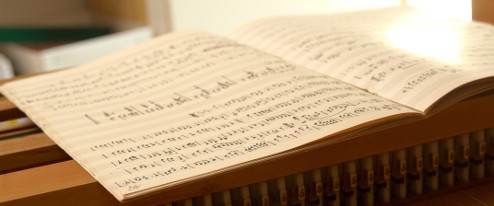The Era of Neo-Baroque
“. . . of course, that’s unmistakably ‘baroque Frenzel’ ”, say the music experts and nod their approval. (Kurier)
…a blend of modern, swinging rhythms that artfully entwine around baroque sounds, or vice versa: Franz Xaver Frenzel always combines old and new into a harmonious symbiosis, which nips in the bud any fear of modern music that may linger in some people. It is clear, concrete music that finds its way to ear and heart through catchy rhythms and melodies (Karin Schütze, OÖ-Nachrichten)
. . . also in his Violin Concerto in A Major, dedicated to the prominent philharmonic violinist Clemens Hellberg, he rushes the soloists and musicians through set elements and cadences from the realm of early music, sprinkled with some irony, and definitely very inventively combined. You can laugh about it or even ponder profoundly whether it is concealing a signal of some sort: some say it is meant for a cerebrally oriented and thus misled avant-garde, others say it points to the lack of musical understanding of wider audiences. The piece by Franz Xaver Frenzl that had its premiere in this concert shows evidence of something else: This music moves in the direction of postmodern reinterpretation . . . (Reinhard Kriechbaum, DrehPunktKultur)
. . . fantasies on strings of the musical universe! Bizarre and unpredictable! Katt, aka Frenzel, plays with different styles on a technically remarkable level and combines baroque polyphony with romantic tonal splendor and swinging rhythms of today, and at the same time he positions his music in the style associated with Fantastic Realism . . . (Michael Wruss, Upper Austrian News)
. . . because Frenzel’s pieces oftentimes break the mold, the pleasure lies where the pieces cross boundaries and allow him to travel via a time machine two centuries into the future . . . (Dr. C. Knotig, Austria–music magazine)
. . . in which he probably wants to draw attention to a typical way of life: Baroque life . . . (Dr. Walter Dobner, Presse)
. . . a delighted and amused audience. (Salzburger Nachrichten)
. . . and neither does he have to fear for his artistic identity nor the accusation of hostility towards the avant-garde – it is simply the freedom to do otherwise. (Klaus Khittel, Wochenpresse)
. . . Congratulations on your record that gave me a lot of listening pleasure. Not only do I find the idea delightful but also its excellent realisation. (Karl Löbl, ORF)
. . . a musical lark which can be taken perfectly seriously according to the Mozart model: it has style in its thematic inspiration and polyphonic arrangements…and for pure enjoyment there is a symphony of strings. It seems the most progressive Frenzel is already vaguely anticipating the harmony and rhythm of Britten and Hindemith as well as a Grieg who wanted to compose in Holberg’s time. It requires a lot of talent to so heartbreakingly fib a Bach air in the violin solo in the Adagio! (Fritz Walden)
. . . Mauricio Kagel once said that today many composers write only for composers any more. Matters are quite different with the only “surviving Austrian baroque composer” Franz Xaver Frenzel, aka Friedemann Katt. Katt composes in line with almost all great composers in music history and he does so not only in baroque style. Impressive evidence of this can be found in his “Engelsoratorium” as performed in the Old Cathedral of Linz. From Gabrieli, Bach, Handel, and Mozart to Webber, Katt retrieves numerous sound witnesses into his artistic universe and thereby creates a highly original great oratorio. It is not about taking the secure way to success and emotion. No, it is a brilliant conscious re-creation on a deeply spiritual ground – Rilke, Psalms and the Bible provide the lyrics. (Norbert Trawöger – Kronen Zeitung)
. . . He is a thoroughly “contemporary” composer whose works will find appeal – after all, Katt is a serious musician who has learned his craft, and simply makes good music. . . (Eva Stadler, Madame)
. . . could be rightly regarded as one of the greatest among the small masters of the late baroque. (Siegfried Nouschak after the premiere of the first trumpet pieces in a conversation with the Holy Cross Fathers.)
…Professionals repeatedly take his pieces for works by an unknown master and are slightly perplexed when the music starts to swing slightly. . . (Kronenzeitung)
. . . the performance at the premiere of the Piano Concert in C Minor deeply impressed the audience. On the surface the score uses the musical dictation of the old masters. But as it unfolds, it risks stylistic and melodic side glances up to the present day: a well-rounded whole with three clearly distinctive movements that fully engulf the audience. Excellently instrumented… (Franz Zamazal, Upper Austrian News)
Excerpt from a letter from Dr. Clemens Hellsberg regarding the violin concerto ”. . . and I do hope you have noticed how much I enjoyed it. Of course I am very proud to be a dedicatee of a piece that so excellently combines depth and entertainment, imagination with formal clarity and outstanding composing skills with a feel for the instrumental. It gives the violinist an opportunity to present a technique that is not l’art pour l’art but requires manual and mental ease and presents charming challenges regarding tone and musicality.“
Über den Stil der Musik
Bei aller Divergenz der möglichen Standpunkte in der Stellungnahme zu künstlerischen Aussageformen mag ein Aspekt in der Begegnung mit Friedemann Katts kompositorischer Sprache eine ‚phänomenologische’ Überlegung triftig erscheinen lassen. Die Sache selbst: eine mehrere Stile einbeziehende Kompositionsform. Sie bewirkt noch nicht den Anspruch, als originäre Schöpfung deklariert zu werden.
Im OEuvre Katts begegnet jedoch eine musikalische Sprache, deren Vornehmheit und Kultur einem enzyklopädistischen Geist entspringt.Die stilistischen Mittel liegen jeweils im Bereich des durchaus „Vertrauten“, aber Katt entfaltet daraus einen solchen Schwung, dass etwas Elektrisierendes daraus wird – Ausdruck einer modernen Vitalität innerhalb des klassischen Stilwillens.
Gleichen musikalische Erneuerungsbewegungen des 20. Jahrhunderts mitunter einem „Monolog“, mit dem sich Komponisten in einer oft rätselhaften Weise ausdrücken, die jedoch authentisch wirkt und betroffen macht, so führt etwa der Neoklassizismus einen spannenden Dialog mit der Geschichte. Der Neoklassizismus ist als eine „Musik über Musik“ beschrieben worden, die denkbar eng an historische Musik anschließt, den historischen Vergleich herausfordert, ihm standhalten will oder auch historische Musik und neuartig frisch erfahrbar macht. So spielt – um die konkrete Thematik wieder aufzugreifen –der Rieder Komponist Friedemann Katt mit Traditionen, er zerstört sie nicht, sondern erweitert sie. – Katt bezieht sich in einer unerschöpflichen Fülle an Möglichkeiten auf das „Ganze“ der Musikgeschichte, aus der keine Epoche ausgegrenzt wird. Der enge Anschluss an die Tradition kann ganz unterschiedliche Formen annehmen und sowohl eine Affinität als auch eine Distanz zu historischer Musik ausdrücken. Das Anspielen auf historische Formen und Satztechniken wird in Katts Kompositionen auch durch demonstrativ historisch wirkende thematisch-motivische Erfindungen spürbar sowie durch übersichtlich gestaltete Formabläufe. Mit der Verfremdung historischer Techniken und Formen werden eingeschliffene Hörgewohnheiten unterlaufen, um sie aufs Neue zu stimulieren. Katt erzielt neue musikalische Wirkungen mit Mitteln historischer Musik. Es geht um ein Komponieren „im“ alten Stil – nicht um ein Komponieren „mit“ dem Stil einer älteren und vergangenen Musik. Es handelt sich dabei um eine polystilistische Kompositionsform, keineswegs um reaktionär-epigonale, unwahre Musik mit Stilmaskeraden ohne Substanz.
Damit ist es auch gelungen, das Interesse für Pluralismus in der musikalischen Stilvielfalt zu wecken und die Aufmerksamkeit eines breiteren Publikums anzusprechen. Wie sich selbst, so hat er seine Kunst frei und unberührt zu halten gewusst von der Krise im europäischen Geistesleben, die sich auf musikalischem Gebiet vor allem durch die tiefgreifende Entfremdung zwischen Publikum und schöpferischem Musiker ausspricht. Eine Krise, die überwunden werden muss, soll ein lebendiges Musikleben weiterbestehen. (Prof. Franz Danksagmüller)

